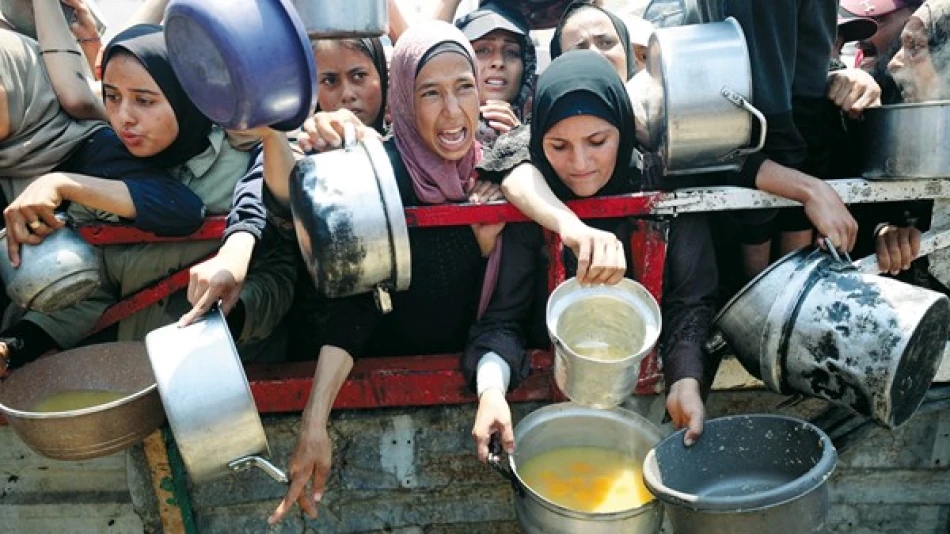
UN Warns of Worsening "Deadly Hunger" Crisis in Gaza
Gaza's Humanitarian Crisis Reaches Breaking Point as 100,000 Children Face Starvation
The United Nations has issued stark warnings about Gaza's deteriorating humanitarian catastrophe, with over 100,000 children now at risk of death from malnutrition and starvation. As Israeli military operations continue and border restrictions tighten access to essential supplies, health centers are recording hundreds of acute malnutrition cases daily, marking what officials describe as an unprecedented humanitarian disaster unfolding in real-time.
Critical Food Shortage Threatens Gaza's Most Vulnerable
The UN Office for the Coordination of Humanitarian Affairs (OCHA) reported that catastrophic conditions in Gaza are rapidly deteriorating, with what it termed a "deadly hunger crisis" now claiming lives daily. Local health authorities confirmed two additional starvation-related deaths in a single day, bringing the total famine and malnutrition death toll to 122, including 83 children.
Among those most at risk are approximately 100,000 children under two years old, including 40,000 infants under one year. The complete absence of infant formula and nutritional supplements has forced desperate mothers to feed their babies water instead of milk, according to Gaza's Government Media Office.
Healthcare System on the Brink of Collapse
Gaza's medical infrastructure is struggling to cope with the surge in malnutrition cases. Hospitals and health centers lack the resources to treat or respond to the hundreds of life-threatening acute malnutrition cases being recorded daily. The healthcare system's near-collapse has left medical professionals virtually powerless to address the crisis.
OCHA emphasized that hunger and malnutrition significantly increase susceptibility to diseases that weaken immune systems, particularly affecting women, children, elderly people, and those with disabilities or chronic conditions. Pregnant and breastfeeding women face especially severe risks, with increased likelihood of delivering babies with serious health complications.
Border Restrictions Hamper International Relief Efforts
The limited supplies entering Gaza fall drastically short of meeting the population's enormous needs. UN officials cite multiple factors preventing adequate humanitarian response: unreliable border crossings, routine blocking of vital supplies, and continuous danger faced by relief workers.
OCHA stated that if Israel opened crossings, allowed fuel and equipment entry, and permitted humanitarian staff to work safely, the UN could accelerate delivery of food aid, health services, clean water, waste management, nutrition supplies, and shelter materials. However, various restrictions imposed by Israeli authorities continue to obstruct humanitarian workers' ability to respond effectively.
Forced Displacement Compounds the Crisis
The UN Relief and Works Agency for Palestine Refugees (UNRWA) reported that Palestinians in Gaza are being forced to relocate repeatedly under Israeli military orders, despite having nowhere safe to go. The agency emphasized that no safe zones exist in Gaza, with everyone suffering and no one—including relief workers, healthcare personnel, or UN staff—remaining secure.
International Response and Long-term Implications
This humanitarian crisis represents one of the most severe food security emergencies in recent memory, with parallels to historical famines that claimed thousands of lives. The situation in Gaza demonstrates how quickly modern humanitarian disasters can escalate when basic infrastructure, supply chains, and medical systems simultaneously collapse.
The international community faces mounting pressure to establish reliable humanitarian corridors and ensure sustained access to essential supplies. Without immediate intervention, health experts warn that Gaza's malnutrition crisis could result in generational health impacts, affecting child development and population health for decades to come.
The current trajectory suggests that without significant changes to border policies and sustained international humanitarian intervention, Gaza's food crisis will likely worsen, potentially leading to one of the most severe humanitarian catastrophes in the region's modern history.
Most Viewed News

 Layla Al Mansoori
Layla Al Mansoori






